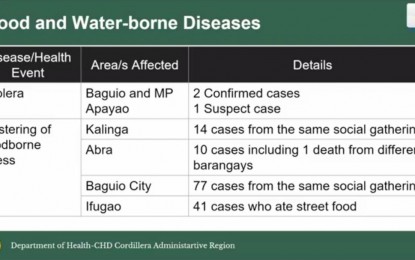
FOOD-BORNE ILLNESSES. The Department of Health (DOH) has cautioned the public to check on the food they eat and the water they drink, especially during gatherings. Karen Lonogan, a nurse at the Regional Epidemiology and Surveillance Unit of the DOH-Cordillera, said in a press briefing on Wednesday (Oct. 26, 2022) that several incidents of cholera and food-borne illnesses were recorded in recent weeks with clustering of cases noted from social gatherings. (Screengrab from DOH-Cordillera report)
BAGUIO CITY – The Department of Health (DOH) in the Cordillera region has cautioned the public against the effects of unsafe and unsanitary food preparation practices.
“We need to prepare food observing the proper sanitation standards aside from checking the sources of water for food preparation and drinking,” a nurse at the Regional Epidemiology and Surveillance Unit of the DOH-Cordillera, Karen Lonogan, said in a press briefing on Wednesday, citing several cases of food and water-borne diseases in the region in the past three weeks.
Lonogan said they have monitored a clustering of cholera and food-borne illnesses, which came from social gatherings and from eating street food.
Two confirmed cases of cholera were recorded in Baguio City and Mountain Province while one suspected case was logged in Apayao.
Cholera is an acute diarrheal infection caused by the ingestion of food or water contaminated with the bacterium vibrio cholerae.
It takes between 12 hours and five days for a person to show cholera symptoms after ingesting contaminated food or water.
Cholera affects both children and adults and can kill within hours if untreated, according to the World Health Organization
Lonogan said the clustering of food-borne illnesses was observed in Baguio City and the provinces of Kalinga, Abra and Ifugao.
In Kalinga, 14 people who attended a social gathering were affected while 10 cases, including one death in Abra, were recorded in different barangays.
In Baguio City, 77 people who went to a social gathering were affected while 41 people fell ill in Ifugao after eating street food.
She also said the changing weather may affect the food's quality, especially if these are improperly prepared.
“Let us be conscious and cautious of the food we eat and the source of the food we take in,” she said.
Lonogan advised the public to avoid taking medicines that would stop the loose bowel movement (LBM) and instead hydrate the body by taking in lots of water and avoiding greasy food.
An oral rehydration solution will also help, consisting of one teaspoon of salt mixed with nine teaspoons of sugar diluted in one liter of water.
“You need to remove the toxins in the body for the LBM to stop,” she said.
She said the LBM should not be ignored as it can cause death if not immediately treated. (PNA)
